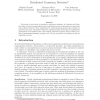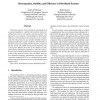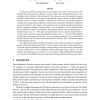732 search results - page 23 / 147 » A Formal Model of Provenance in Distributed Systems |
ACTA
2007
14 years 10 months ago
2007
We provide a novel model to formalize a well-known algorithm, by Chandra and Toueg, that solves Consensus among asynchronous distributed processes in the presence of a particular ...
ICMAS
1998
14 years 11 months ago
1998
This paper explores the increasing the heterogeneity of an agent population to stabilize decentralized systems by adding bias terms to each agent's expected payoffs. Two appr...
ICPADS
1996
IEEE
15 years 1 months ago
1996
IEEE
A new multiagent programmingparadigm based on the transactional logic model' is developed. This paradigm enables us to construct a Distributed agent transactional program (DA...
LPAR
2010
Springer
14 years 7 months ago
2010
Springer
A rational and selfish environment may have an incentive to cheat the system it interacts with. Cheating the system amounts to reporting a stream of inputs that is different from ...
FM
2001
Springer
15 years 2 months ago
2001
Springer
This paper describes a reduction technique which is very useful against the state explosion problem which occurs when model checking many distributed systems. Timestamps are often ...



